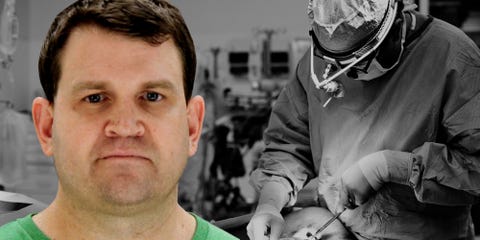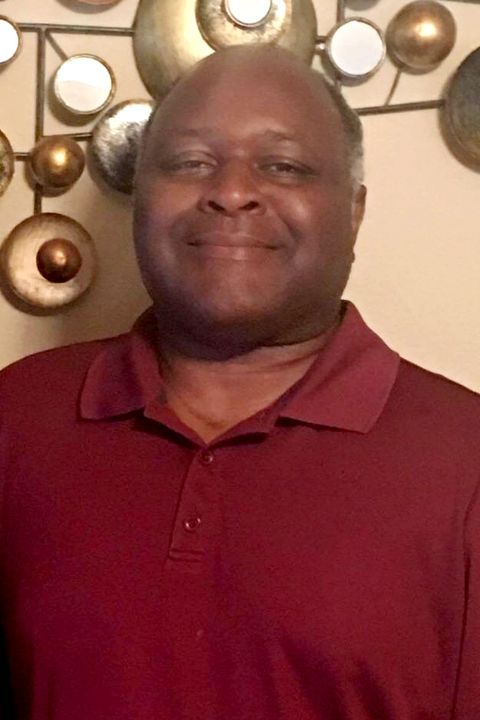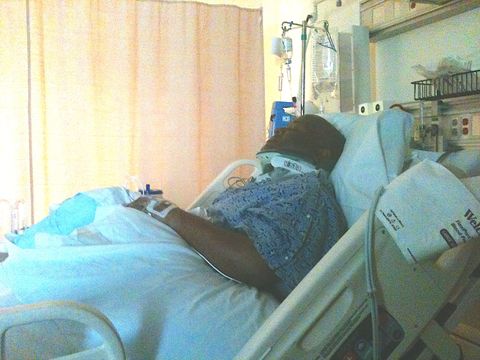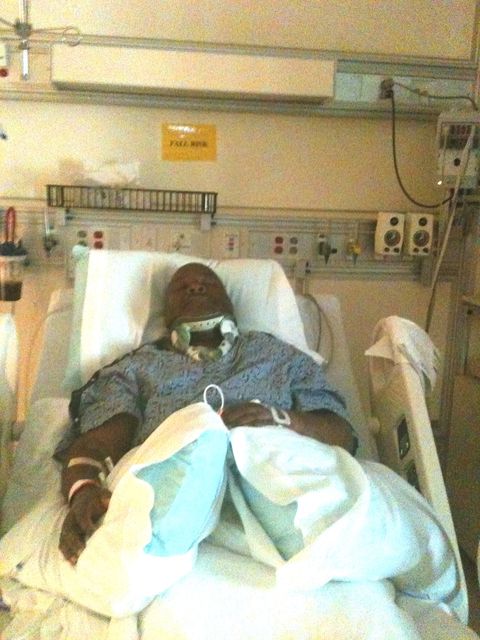Dr. Death Botched Dozens of Surgeries. One Victim Shares His Story.

As Philip Mayfield prepared for spinal surgery, he stared into the bright operating room lights and said a silent prayer to God. I’m grateful to you, the Most High, he thought, I know you will protect me from all form of danger, and keep me safe.
Then, the anesthesia took over and Philip’s world went dark.
When he came to eight hours later, a crowd of panicked nurses surrounded his recovery bed.
“Mr. Mayfield, can you move your legs for us?” they asked.

His body felt heavy and uncomfortable. He tried lifting his arms and wiggling his toes, but nothing moved.
“Mr. Mayfield, we really need you to try and move your legs,” they pleaded.
I am! he thought. Then he realized what the nurses had likely already surmised: I must be paralyzed.
On April 9, 2013, the 48-year-old Dallas, Texas truck driver went in for a 45-minute surgery to alleviate chronic back pain, the result of nearly two decades behind the wheel of his tractor-trailer. He left the operating room unable to move from the neck down.
Philip is one of more than 30 people maimed by Dr. Christopher Duntsch, nicknamed Dr. Death by the media. Over the course of 18-months, the nefarious ex-surgeon performed a spree of botched operations that resulted in two deaths and multiple cases of paralysis, including that of his childhood friend. Duntsch is currently serving a life sentence in prison for deliberately maiming a patient.
His malpractice is the focus of a new Wondery podcast from the creators of Dirty John, called Dr. Death, now available on iTunes. The six-part series delves into the egregious failure of the healthcare system to stop Duntsch—and the tragic stories of those he damaged, like Philip, during their most vulnerable state.
For nearly 20 years, Philip drove his 18-wheeler from his home in Texas to Louisiana and Oklahoma as a professional truck driver. “I loved my job,” he says. “You get to experience so many different things and see different places and meet new people. Some people say, ‘How can you drive for so many hours a day?’ But, to me, driving was so relaxing.”
Over time, however, the constant loading and unloading of goods led to severe back and neck pain and, eventually, a disc herniation. In 2012, doctors recommended anterior cervical discectomy surgery, a procedure to remove the damaged disc from the spine. It required going through the front of the neck to retrieve the disc.
For nearly a year, Philip and his wife, Angela Mayfield, 44, researched the surgery, sought opinions from six different doctors, and consulted Medical Board reviews. They eventually settled on Dr. Christopher Duntsch, who was linked to a major hospital system in Dallas. During their first consultation, Duntsch “seemed very confident in what he did,” Philip recalls. “My biggest questions [for him] were did he know what he was doing? And had he ever harmed anyone?”
Duntsch assured the Mayfields, with confidence, he did these types of surgeries all the time, and Philip would be driving again in just four weeks. “Leaving his clinic, we had a sense of ‘Well, okay [Duntsch] is the one to do this!’” Angela says.
Three weeks later, on the morning of his surgery, Philip woke up at 5:15 a.m. in preparation for the 6 a.m. appointment. He thought to himself: Let’s do this.
“Are you ready?” Angela asked on the 20-minute drive to the surgery center.
“Yes, yes,” he assured her. “I just want to get back to work and do what I love.”

The couple wasn’t scared or nervous. In fact, they felt calm. They wanted to get the surgery over with, so Angela could get home to whip up lunch for their three kids, Philip Jr., 19, Austel, 15, and Ha’Layalai, 13. “We went in with the expectation that whatever was going on with [Philip’s] neck, it would be taken care of, no problem,” Angela says. “And he’d be back to normal in no time.”
Once in the pre-operating room, Duntsch took a black marker from his scrubs and drew a line near Philip’s collarbone. “That’s where I’ll be going in to do the procedure,” he said.
Philip prayed to God for a healthy recovery as he laid down on the operating table. Then the anesthesia was administered.
Duntsch had told the Mayfields the procedure would take 45 minutes at most. So, when Angela didn’t hear anything for an hour, she got worried. After two hours, she paced the waiting room floor in a panic. Hospital administrators assured her a nurse would deliver an update soon. But no one did. “I had a [bad] feeling that something was going on,” Angela says. “Nobody was giving me answers.”
At 1:30 p.m. Duntsch finally entered the waiting room and sat down with Angela.

“Everything went well,” he told her. “You can see your husband now.”
Angela grabbed her purse and ran to the recovery room, where nurses surrounded a barely-conscious Philip. “Something was wrong,” Angela says. “The nurses were running around, panicked and nervous, looking like ‘What’s going on?!’ They called for Dr. Duntsch to come in.”
Duntsch and the nurses attempted to prop up Philip, but he fell over “like a little baby,” Angela says. “He had no control, no support of his own. He was just flopping around.” An excruciating pain was rocketing through Philip’s body and he could barely speak.
A few hours later, Philip was transferred to a different hospital, where a doctor performed a “pin prick” test to assess reflex abilities and response to pain. He had no feeling in his body, up to his breast line.
“This is from the surgery,” the doctor told him. “This was a botched surgery.”
An MRI scan confirmed the worst: Philip’s spinal cord had been completely deformed. The damage, doctors told the Mayfields, was irreversible. Philip was put on steroids to bring down spinal cord swelling and transferred to the ICU, where he remained for five days.
“They couldn’t try to [undo] anything that was done, because there was already too much trauma that his body had endured,” Angela says. “It couldn’t be fixed.”
“They told me I’d never be able to walk again,” Philip adds. “But I told them, ‘Yes I will, yes I will walk again, I have a life that I have to live. I have three boys I need to raise.”
Philip is just one of Duntsch’s 32 victims maimed at several medical centers in Texas. Not all were lucky enough to survive.
Kellie Martin’s major artery was slashed during a procedure, and the school teacher, 54, bled to death. Floella Brown, 63, passed away shortly after suffering a massive stroke the day after Duntsch sliced her vertebral artery during surgery.

Brown was still in the ICU when Duntsch began spinal surgery on Mary Efurd, who later woke up hardly able to move her legs. A CT scan found metal spinal fusion hardware that had sunk into the muscles of her lower back, inches from her spine. Duntsch had also amputated a nerve root, according to the Texas Observer.
The Dr. Death podcast traces Duntsch’s rise at the University of Tennessee, a top-tier medical school, to his position at the Baylor University Medical Center, where he was granted surgical privileges.
Dallas-based journalist Laura Beil hosts the series and interviews doctors, nurses, friends, and several patients. What she found was a shocking number of people who were witness to Duntsch’s atrocities and a healthcare system that failed to stop him.
According to the Texas Observer, one of Duntsch’s first botched surgeries took place in January 2012 and led to bone fragments from the patient’s vertebrae getting lodged in the nerves of his back. Despite his reckless behavior, Duntsch continued operating at various hospitals in Dallas, before losing surgical privileges in June 2013 when fellow surgeons complained to the Texas Medical Board, reports Dallas Magazine. Earlier that month, Duntsch had accidentally cut into a patient’s vertebral artery and left a sponge festering in the soft tissue of their throat, per the Texas Observer.
Beil calls Duntsch an “outlier” in the medical field, but admits that, through her research, she hasn’t found much evidence that anything has changed to prevent something like this from happening in the future.
Philip harbors no hate toward the surgeon that ruined his life. Instead, he exacted revenge by attempting to recover. After being released from the hospital in 2013, Philip spent most days in rehab, eventually moving from a wheelchair to a walker to a cane.
Today, his entire right side and left arm still have some paralysis that can be “very painful,” he says. “I also have weakness in all four limbs, and there’s days I wake up and can’t move.” In 2014, he developed syringomyelia, a painful condition that causes fluid-filled cysts on the spinal cord.
The sentence is LIFE in prison for surgeon Christopher Duntsch. @NBCDFW #NBCDFWNow pic.twitter.com/Klfcq88Vft
More excruciating is Philip’s complex regional pain syndrome, a rare type of chronic pain that causes his skin to blister and peel off. He likens the sensation to someone dousing him with gasoline and setting him on fire. “Pain, stabbing, shooting, aching, muscle spasms, continuous contractions,” he says. “And it’s full body.”
His family has learned to look out for Philip’s random fainting spells, which occur every few weeks. Once, he woke up at 2:00 a.m. to use the restroom and lost consciousness. Angela says: “Our children have learned to deal with the syncope and our frequent hospital trips.”
Since Philip can no longer drive his 18-wheeler, the family survives on a disability check and Angela’s income as a work-at-home reservation specialist for a hotel-booking company. She quit her job at the corporate offices of J.C. Penney to take care of her husband.
Last year, their eldest son, Philip Jr., received a scholarship to play football at Angelo State in San Angelo, Texas. So far, his father’s pain has been too agonizing to endure the five-hour drive to attend a game, but this year Philip is determined to see his son play.
“We talked to doctors and he said, ‘I have to go to a game,’” Angela says. “My husband has this resilience of, like, ‘I can do this, we’re going to do this because our trust and faith in God never fails!’ “

Duntsch, sentenced to life in prison in February 2017, is believed to be the first surgeon sentenced to go to prison for a botched surgery, according to USA Today. “This defendant single-handedly ruined their lives, and he gave each of them a life of pain,” prosecutor Michelle Shughart told jurors in closing statements.
“So why didn’t he stop?” Shughart reportedly said. “Because of greed. Because he owed people a lot of money. He wanted to live the high life and a neurosurgeon makes big bucks. Why didn’t he stop? Because he had no conscience. He doesn’t care what he has left in his wake.”
Duntsch is currently appealing his conviction.
In 2017, Philip testified against Duntsch in court, but he didn’t look the disgraced surgeon in the eyes. Today, if Philip could confront Duntsch, he would. “I would tell him that I forgive him,” he says. “Even though… he hasn’t asked [me] for forgiveness, or said anything to any of the patients that were affected.”
Philip pauses. He’d also like Duntsch to know that he’s “going to do whatever it takes to get to my son’s football game,” he says. “Because I don’t quit.”
From: Esquire US
Source: Read Full Article



